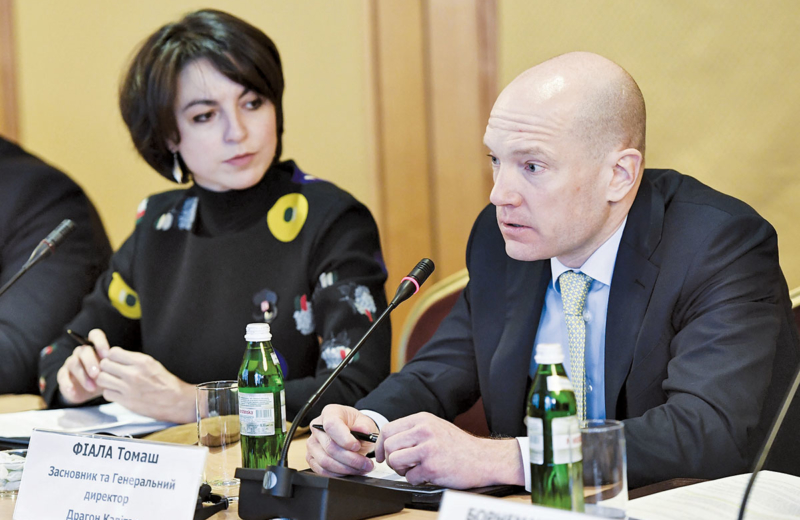As 2017 comes to an end, investors are worried about Ukraine’s business climate and don’t see much improvement coming next year.
The European Business Association, with 960 members, on Dec. 18 presented their report on Ukraine’s Investment Attractiveness Index, which shows the mood of investors. For the second half of 2017, it has dropped by 0.12 points to 3.03 on a scale of 1 to 5. A 3 puts the investment climate in neutral territory.
Even though this figure is still one of the highest since 2011, the downward trend is worrisome. Businesses blame ongoing massive corruption, lack of judicial reform and corruption in law enforcement agencies and courts.
There are fears the situation will only worsen as the 2019 election season draws close.
Tomas Fiala, president of the European Business Association and head of Dragon Capital, a leading investment firm, says that Ukraine is falling short in economic growth and investment attractiveness.

The European Business Association Investment Attractiveness Index shows the mood of businesses in Ukraine since 2008. The index has never entered the positive zone. The highest score was registered at the end of 2010, beginning of 2011, when it scored 3.4 points out of 5.
Poor growth
Ukraine will show no more than 2.2 percent in gross domestic product growth in 2017. For a developing country, this is very low. This is lower even than the global GDP growth of 2.5 percent.
“Of course this is better than the negative 17 percent rate during the 2014–2015 period,” Fiala said. “But this is much worse that Ukraine’s Western neighbors. That means that next year they will grow much faster than what we are expecting to see in Ukraine, which is 3 percent.”
Poroshenko deadlines
One way to make a step forward would be to establish the State Bureau of Financial Security, an independent state body that would investigate tax crimes.
President Petro Poroshenko met with the EBA as well as other associations on Sept. 14, when he promised to present a law on the bureau in four weeks.
“Unfortunately we still did not see this law and the only thing we have seen was a slideshow presentation regarding the concept two weeks ago,” Fiala said. “The president also promised that… businesses would be able to comment on the law, to add amendments or rewrite it.”
It still didn’t happen.
“The second deadline that the president set himself was that the parliament would vote on it by the end of the year,” Fiala said. “This week is the last sessional week, we still didn’t see this law so most likely it will not be voted for.”
And the third deadline that Poroshenko set for himself is that the bureau will start working from the second quarter of next year. Fiala is doubtful that this deadline will be met as well.
“This personally makes me upset, after the president made promises in front of 300 of Ukraine’s largest investors and businesses,” he said. “In order to build trust towards the government and the president, these promises should be met by the deadlines.”
Low FDI
All of these developments harm foreign direct investment in Ukraine. In 2017, FDI totaled only $2 billion, of which about a fourth went towards recapitalizing banks. Fiala says this figure of foreign investments should be five times larger.
Ukraine’s 2017 economic output is close to $95 billion, also a very low number for a nation of 42 million in the center of Europe.
EY’s Partner Vladimir Kostenko said that attracting foreign investment is the only way for Ukraine to develop. “There is no other way to increase Ukraine’s GDP… other than attracting a huge amount of FDI,” Kostenko said.
Ansgar Bornemann, managing director of Ukraine and Moldova, explained why: If Ukraine does not attract investments, then output capacity will depreciate and employment will fall.
Investors have many choices in the region that they are finding more attractive, such as Poland or Hungary.
“I also have to fight in my company and convince my bosses to invest in Ukraine, to invest in our factories, in our roads,” Bornemann said.
For Nestle, FDI plays a major role in boosting the purchasing power of consumers.
Losing workers
Retaining workers is another major problem, according to Anna Derevyanko, EBA’s executive director. “The outflow of professionals became a trend of this year,” she said. Many Ukrainians have fled to neighboring countries such as Poland in search of better-paying jobs and more stable lives.
Stick with IMF
Despite the negative trends, Fiala is continuing to bet on Ukraine. Dragon Capital has 10 projects in the pipeline and hopes to invest $300 million next year in Ukraine.
“We are ready to purchase only very cheap businesses. If we have bought such businesses over the border in the West then we probably would have had to pay three times more,” he said.
Investment in export-oriented businesses may be a good bet because of the hryvnia’s steep devaluation — shedding more than two-thirds of its value — since 2014.
The hryvnia’s value will keep going down if the government doesn’t get back on track with the International Monetary Fund lending program, frozen in April after $8.4 billion was lent out of a $17.5 billion program by the end of 2018.
Without IMF lending, the currency will sink to at least 30 hryvnias per dollar, Fiala said.
This year the government successfully sold $3 billion worth of Eurobonds, buying the state’s finances some time.
But Ukraine’s leaders have traveled to several foreign capitals and pledged to stick to the IMF reform agenda.
“The main promise done to investors during the road shows was that Ukraine will receive another tranche from the IMF and that it would meet IMF conditions,” Fiala said. “Unfortunately most of these were not met… and we lost trust towards the government.”



